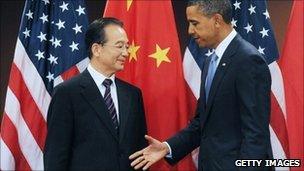US House passes China currency sanctions bill
- Published

The US has found China less cooperative than they would have liked over the value of the yuan
The US House of Representatives has backed legislation that would pave the way for trade sanctions on China.
The Democrat-backed bill passed by 348 to 79, and targets countries that hold down the value of their currencies, as many accuse China of doing.
To become law, the bill would also need to be passed by the Senate - unlikely before November mid-term elections - and then signed by President Obama.
China said the bill contravened World Trade Organization rules.
"Starting a countervailing investigation in the name of exchange rates does not conform with relevant WTO rules," commerce ministry spokesman Yao Jian told China's Xinhua news agency.
The White House did not formally back the proposed new law.
But it did provide advice to legislators to ensure the bill did not conflict with WTO rules.
Earlier on Wednesday Mr Obama said: "The reason that I'm pushing China about their currency is because their currency is undervalued.
"That's not the main reason for our trade imbalance but it's a contributing factor."
'Cheap' yuan
The US accuses China of keeping its currency, the yuan, artificially cheap against the dollar in order to give its exports an unfair price advantage.
China has begun recording increasingly larger trade surpluses again since the global recession ended last year.
The US has similarly slipped back into trade deficits, despite weak growth and near-10% unemployment.
"We cannot rely on the Chinese government to voluntarily do the right thing," said a Republican sponsor of the bill, Tim Murphy. "The expiration date for appeasement has long since passed."
But the bill is not universally popular in the US and has been opposed by the US Chamber of Commerce, among others, who say it will do more harm than good to job creation and growth.
The draft legislation would require the US Commerce Department to determine the extent to which a currency is undervalued, in any case of unfair trade practices brought to it.
In August, the department decided to drop a more general investigation into the value of the yuan, despite deciding that China had unfairly subsidised its aluminium exporters.
Promises of 'flexibility'
Meanwhile, the Chinese central bank promised to make the exchange rate more flexible, but without specifying what measures it would take.
"[China will] further improve the yuan's exchange rate regime based on market supply and demand, with reference to a basket of currencies," the People's Bank of China said in a quarterly report released on Wednesday.
The reference to a "basket of currencies" may be encouraging for the US, as the dollar has weakened against other major currencies in recent weeks.
Under pressure from the US, China abandoned its fixed exchange rate to the dollar in June.
However, the exchange rate to the dollar is controlled by the People's Bank of China, which sets a daily rate, and since abandoning the peg, Beijing has only allowed the yuan to appreciate about 2%.